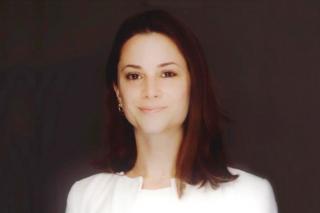Professor Charlotte Powley is both a researcher and an advocate. Her work reveals the urgent need for free access to period products. Professor Powley spoke with us about her recent findings and what needs to be done to achieve menstrual equity.
Your dissertation covered women's access to period products. Can you tell us more about this?
Before graduate school, I was a New York City public high school teacher. I attended a women-centered university as an undergraduate and I always had an interest in gender and reproductive rights. As a high school teacher, I regularly had students asking me for pads and tampons. I paid out of pocket to help my students and I know other teachers were doing the same. However, I believed that these products should be freely distributed by schools and not just in the nurse's office. Students should have the autonomy and ability to access these items on their own.
When I left teaching in 2015, I went to Tufts School of Medicine to pursue a master's in Public Health. At this time, I really started to think about menstrual equity. I first developed a survey for menstruators who struggle with housing insecurity. When I began a doctoral program in Social Policy at Brandeis University, I realized that this was a great way to combine my background in education with my dedication to student wellbeing and public health.
My dissertation was a mixed-methods study in a local Massachusetts school district. I interviewed students, teachers, nurses, and counselors. I also did focus groups with students and conducted quantitative research based on the Youth Risk Behavior Survey. I found that over 30% of students did not know whether or not their school offered free access to pads or tampons. Moreover, over 25% of menstruating students miss at least one day of school while they are on their period, which can equate to approximately two weeks per academic year. This data revealed to me that we have a long way to go to achieve both menstrual equity and educational equity.
I do have intentions to publish this research, and recently submitted a manuscript to the Women's Reproductive Health Journal.
What can American universities and other institutions do to facilitate women's access to period products?
Products need to be offered in bathrooms for free, no questions asked. It is as simple as toilet paper, hand soap, and paper towels. These products should always be freely available in public restrooms, including university restrooms. It is great to see Simmons making products available in bathrooms and other resource rooms on campus.
Can you tell us about your current research?
I have recently been working with Mass NOW and analyzing data that they collected in Fall River with respect to the needs of menstruators there. Menstruators seem to have a desire to know more about their cycles and the varying products available. Providing free products is a good first step, and we should accompany this with greater education.
I have been researching this topic since 2015. Even in that time period, the language around menstruation has evolved. For instance, the term “period products” is now preferred as opposed to “sanitary products” or “feminine hygiene products,” which carry a stigma and taboo. For example, “sanitary products” suggests that menstrual blood is unclean, which is not medically accurate. I also like to use the term “menstruators,” because not all individuals who menstruate identify as women. Inclusive language is important as we move forward in the field.
I am also very conscious of particular challenges for low-income menstruators and menstruators of color. It is important to bring this lens to my work.
How did you become interested in the field of public health?
I was interested in this field even before my undergraduate years. In high school, I served as a human development Teacher's Assistant; as seniors, we taught sexual education to the sophomore class. I have always been interested in health-related topics and how to communicate them to students. We must think about students as whole people, and we need to be concerned with more than just their academic success.
What advice do you have for Simmons students wishing to pursue a similar career path?
I encourage student advocacy. There are many interesting public health bills in the state house and there is great opportunity for students to get involved. Advocacy is important for people of all ages but it is especially important for students because they can start building lifetime habits of civic engagement. Entitlement has a negative connotation but part of the whole political process is enforcing what people are “entitled to” or what they deserve and have a right to. Menstruators are entitled to free access to products.

